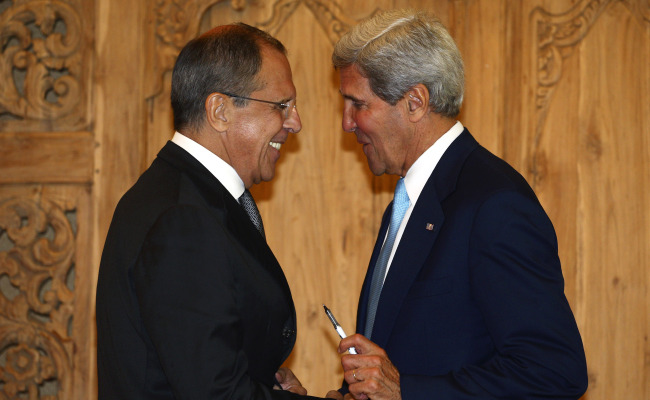 |
U.S. Secretary of State John Kerry (right) speaks with Russian Foreign Minister Sergey Lavrov after a joint press conference on the sidelines of the Asia-Pacific Economic Cooperation (APEC) summit in Bali, Indonesia, Monday. |
Syrian President Bashar al-Assad can take "credit" for moving quickly to eliminate his regime's chemical arms, the United States said Monday, as disarmament experts said Damascus was being "cooperative".
Speaking in Indonesia, U.S. Secretary of State John Kerry welcomed the start of work to destroy Syria's chemical weapons under the terms of a UN Security Council resolution.
"The process has begun in record time and we are appreciative for the Russian cooperation and obviously for the Syrian compliance," he told reporters after talks with Russian Foreign Minister Sergei Lavrov.
"I think it's extremely significant that yesterday, Sunday, within a week of the resolution being passed, some chemical weapons were being destroyed," Kerry said.
"I think it's a credit to the Assad regime, frankly. It's a good beginning and we welcome a good beginning."
Syria agreed to give up its chemical arsenal under last month's UN resolution, which enshrined an agreement struck between Washington and Moscow aimed at averting U.S. military action.
Under the plan, Syria's chemical weapons production facilities must be destroyed by November 1.
The process is being overseen by a joint team from the United Nations and the Organisation for the Prohibition of Chemical Weapons (OPCW), which arrived in Damascus last Tuesday.
On Sunday, it began overseeing the first work to destroy and disable parts of the weapons arsenal.
"It was an excellent first day; stress on the word first," an official from the UN-OPCW mission told AFP on Monday.
"There will be many more days and more milestones and we expect the continued cooperation of all concerned so that we can pass those milestones effectively," he added.
On Sunday, the team said in a statement that Syrian workers "used cutting torches and angle grinders to destroy or disable a range of items" including "missile warheads, aerial bombs and mixing and filling equipment."
Syria's chemical arsenal, believed to include 1,000 tonnes of the nerve agent sarin, mustard gas and other banned arms at dozens of sites, must be destroyed by mid-2014.
At the Hague, the OPCW said some of its officials were heading back from Damascus after talks with Syrian authorities about the operation.
"The discussions were constructive and the Syrian authorities were cooperative," the organization said.
As the operation got under way, Assad admitted in an interview that his government had made "mistakes" in the country's brutal conflict.
But he again denied that his forces used chemical weapons in an August 21 attack that killed hundreds of civilians.
The assault led to threats of a U.S. strike and eventually the UN resolution requiring Syria to turn over its arsenal.
Russia's foreign minister meanwhile said Washington and Moscow had agreed to push for Syria peace talks in mid-November.
Later on Monday, UN chief Ban Ki-moon is expected to send a report to the Security Council detailing the logistics of what is considered one of the biggest and most dangerous disarmament operations ever staged because Syria is an active war zone.
In an interview with Germany's Spiegel magazine, Assad said his government was being "very transparent" with the UN-OPCW team.
"The experts can go to every site. They are going to get all the data from us, they will verify them, and then they can make a judgement about our credibility," he said.
But he also acknowledged that mistakes had been made in responding to the uprising that started as a series of peaceful protests in March 2011 before escalating into a civil war after a brutal government crackdown.
More than 115,000 people have since been killed, activists say. Two million people have become refugees and millions more have been displaced inside Syria.
"Whenever political decisions are made, mistakes happen," Assad said.
"We all make mistakes. Even a president makes mistakes."
Although acknowledging that "reality is not black and white", he insisted that "our fundamental decisions were right".
"You can't just absolutely say 'they carry 100 percent of the blame and we carry zero'," Assad said.
"But basically it's correct that we are defending ourselves."
He denied that he had killed his own people with chemical weapons, saying U.S. President Barack Obama "presents not a single piece of evidence. Not a shred of evidence."
Meanwhile, Lavrov said Russia and the U.S. had agreed to push for the convening of a Syria peace conference in Geneva in mid-November.
"We advocate holding the international conference in mid-November," Lavrov told journalists after his talks with Kerry in Indonesia.
"Today we agreed on the steps needed for both the government and the opposition to come to the conference," Lavrov was quoted as saying by the RIA-Novosti news agency. (AFP)








